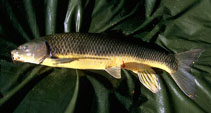| Family: |
Cyprinidae (Minnows or carps), subfamily: Barbinae |
| Max. size: |
49.5 cm FL (male/unsexed); max. reported age: 18 years |
| Environment: |
benthopelagic; freshwater |
| Distribution: |
Europe: Southern Spain and Portugal from Segura to Mira drainages. |
| Diagnosis: |
Diagnosed from other species of Barbus and Luciobarbus in Iberian Peninsula by having the following characters: sharp contrast between dark back and whitish belly in adults larger than 30 cm SL; caudal peduncle stout, depth about 1.2-1.4 times in its length; head length 24-29% SL; lateral line with 42-45 + 3 scales; last simple dorsal ray hardened and rigid on 1/2-3/4 of its length, with small serrae posteriorly along most of length; lower lip with or mostly without median lobe; and lower jaw tip covered by lower lip (Ref. 59043). |
| Biology: |
Occurs in water bodies on low-lying plains, with little current (Ref. 26100). Found in a variety of habitats, most abundant in large rivers and streams with slow to moderate current. Avoids upper, cold water streams. Widely distributed and locally abundant, but populations are greatly fragmented and several of them are potentially threatened as many small streams turn dry during summer. Maximum life span is about 18 years (Ref. 59043). |
| IUCN Red List Status: |
Least Concern (LC); Date assessed: 01 January 2008 Ref. (130435)
|
| Threat to humans: |
harmless |
Source and more info: www.fishbase.org. For personal, classroom, and other internal use only. Not for publication.

